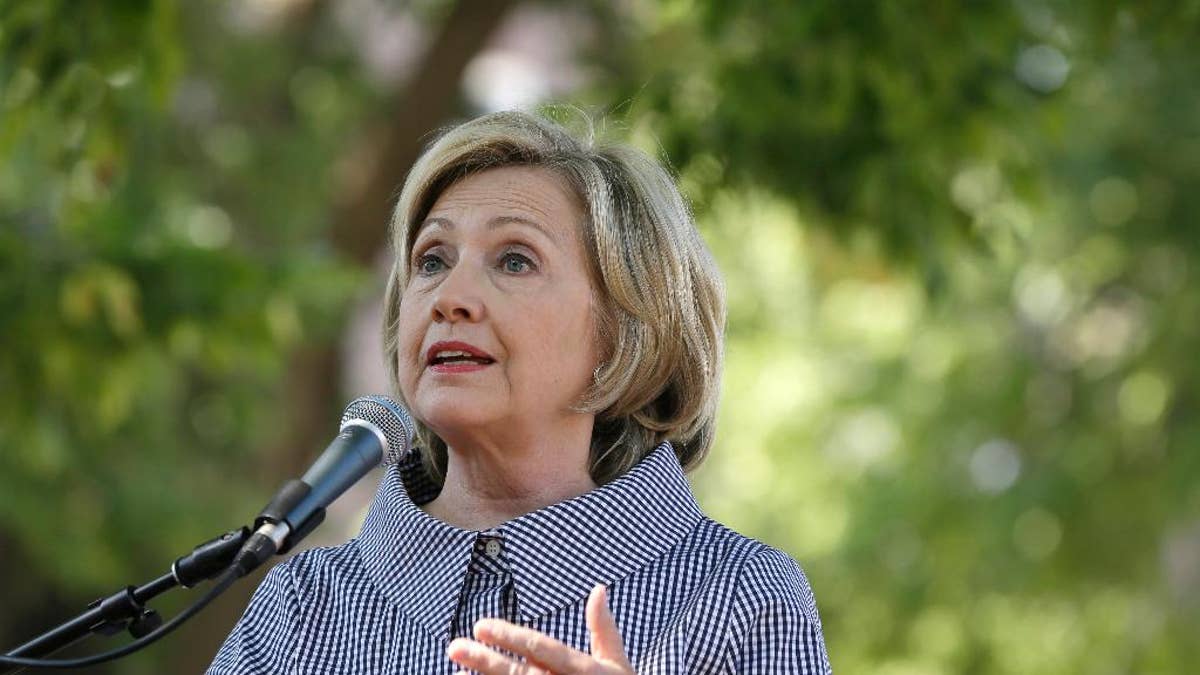
FILE - In this Aug. 15, 2015 file photo, Democratic presidential candidate Hillary Rodham Clinton speaks at the Iowa State Fair in Des Moines, Iowa. The State Department review of Clinton's emails so far has found as many as 305 messages that could contain classified information and require further review by federal agencies, the department said Monday. (AP Photo/Charlie Neibergall, File) (The Associated Press)
WASHINGTON – The State Department review of Hillary Rodham Clinton's emails so far has found as many as 305 messages that could contain classified information and require further review by federal agencies, the department said Monday.
In a court filing that was part of a lawsuit against the State Department, officials told a federal judge in Washington they would be able to meet an existing schedule to release copies of Clinton's emails because only about 5 percent of the messages reviewed so far contain possible secret information that could hold them back for further analysis. The agency said those 305 emails with potential classified data were among more than 1,500 documents analyzed so far.
The filing came after Clinton said in an Iowa radio interview that during her stint as secretary of state in the Obama administration, she had never sent or received any emails on her private server that had information clearly marked classified. Republican critics have warned that Clinton may have compromised national security by sending and receiving messages that contained secret information, but she has sloughed off the criticism, saying she followed security guidelines and is the one who made the previously withheld emails available to the American public.
"If I had not asked for my emails all to be made public, none of this would have been in the public arena," she said in the interview, recorded last Friday. But The Associated Press and other news organizations had sought copies of Clinton's emails under the U.S. Freedom of Information Act for years. The AP was first to identify Clinton's private email server and trace it in March to her family's home in New York. The server was surrendered to the FBI last week, months after Clinton said it was her personal property and wouldn't be turned over.
Clinton said in March she had exchanged about 60,000 emails during her four years in the Obama administration, about half of which were personal and deleted. She turned over the others to the State Department, which is reviewing and releasing them on a monthly basis.
The State Department has censored some of Clinton's emails for national security reasons before they were publicly released. The government blacked-out all or parts of those messages under a provision of the Freedom of Information Act intended to protect material that had been deemed and properly classified for purposes of national defense or foreign policy.
Last month, the inspector general for the State Department warned that some of the information that passed through Clinton's homebrew server was classified information produced by the U.S. intelligence community. It's generally not possible to forward or cut-and-paste an email marked classified to a private account because classified email systems are closed to outsiders. But it can be illegal to paraphrase or retype classified information from a secure email into an unprotected message sent to a personal address.
The State Department acknowledgement that 305 Clinton emails were being reviewed for possible national security concerns came as part of legal sparring in a lawsuit against the agency by journalist Jason Leopold, a reporter with Vice News. In January, Leopold sued the agency to quickly produce Clinton emails and other documents that were sought under a freedom of information request dating back to 2014.
Leopold's case is one of several pending against the State Department for Clinton records. The AP also sued the agency this year for failing to turn over copies of emails and other documents since mid-2013 and in one case, back to 2010. In both cases, U.S. district court judges have pressed the State Department to produce records on a firm schedule.
But Leopold's lawyers have raised concerns that the intelligence review of Clinton's emails has bogged down the schedule of release ordered previously by U.S. District Judge Rudolph Contreras. Leopold's lawyer said the department missed its July target by more than 1,000 pages of emails, in part because of screening by five intelligence agencies.
"It is likely that additional delay above and beyond that added by independent review" by five intelligence agencies "will result," Leopold's lawyers warned.
State Department lawyers said that despite the growing number of Clinton emails that will have to be forwarded to intelligence agencies for review, the government was confident that the low number — 5.1 percent of the total — would not slow down public release of the emails.
Separate from the court case, State Department spokesman John Kirby said 63 of Clinton's emails that previously were unclassified have now been classified and censored — of the more than 3,000 emails released. The numbers of emails, Kirby stressed, represent a "small amount." But it reflects "the care and the scrutiny with which we are scrutinizing this email traffic."
Kirby said there are "intelligence community reviewers sitting with our reviewers as we go through that traffic, so what you're seeing here is exactly what we want to see, which is the proper care and scrutiny being applied to this," Kirby said.
___
Associated Press writer Bradley Klapper contributed to this report.









































